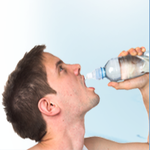The Link between Dehydration and Parkinsons
Is there a link between dehydration and Parkinsons symptoms? The answer is clearly yes. Staying well hydrated is crucial for individuals who experience Parkinsons symptoms.
Dehydration is the excessive loss of body fluids. While it may seem unrelated to Parkinson’s disease at first glance, emerging research suggests otherwise. Dehydration can exacerbate symptoms and potentially accelerate the progression of Parkinson’s in several ways:
- Medication Effectiveness: Many individuals with Parkinson’s rely on medication, such as levodopa, to manage their symptoms. However, dehydration can hinder the absorption and effectiveness of these medications, leading to fluctuations in symptom control.
- Increased Rigidity and Stiffness: Dehydration can cause muscles to tighten and become more rigid, exacerbating the already-present stiffness and rigidity experienced by individuals with Parkinson’s. This can further impair mobility and increase the risk of falls.
- Cognitive Function: Dehydration has been linked to cognitive impairment and mood changes, which are already prevalent non-motor symptoms of Parkinson’s disease. Proper hydration is essential for maintaining optimal cognitive function and overall well-being.
- Risk of Urinary Tract Infections (UTIs): Individuals with Parkinson’s are at an increased risk of developing UTIs due to urinary retention and other urinary tract issues. Dehydration can further predispose them to UTIs, leading to additional complications and discomfort.
- Impact on Gastrointestinal Function: Dehydration can disrupt normal gastrointestinal function which causes constipation, a frequently experienced symptom in Parkinson’s disease. Proper hydration is crucial for maintaining healthy digestion and bowel movements.
Managing Dehydration
It is clearly important for individuals who experience symptoms of Parkinson’s to make hydration a top priority. Some options for staying adequately hydrated:
- Drink Plenty of Water: Aim to consume at least eight glasses of water per day, or more if you’re physically active or in hot weather.
- Monitor Fluid Intake: Keep track of your fluid intake throughout the day to ensure you’re meeting your hydration needs.
- Avoid Excessive Caffeine and Alcohol: Beverages like coffee, tea, and alcohol can contribute to dehydration, so consume them in moderation.
- Eat Water-Rich Foods: Incorporate hydrating foods into your diet, such as fruits (e.g., watermelon, oranges) and vegetables (e.g., cucumbers, tomatoes).
- Set Hydration Reminders: Use alarms or smartphone apps to remind yourself to drink water regularly, especially if you tend to forget.
- Take the Aquas, a formulation designed to hydrate the body developed by researchers in Australia. Find more information at: https://www.aquas.us
Dehydration and Parkinsons Bottom Line
While dehydration may seem like a minor concern compared to the myriad of challenges confronted by persons who experience Parkinson’s symptoms, its impact on the inability of the body to excrete toxins should inform decisions on recovery therapies. Taking proactive steps to stay hydrated, individuals with PD get the opportunity to potentially celebrate symptom relief and improve their quality of life. Stay hydrated to stay healthy!
Robert Rodgers PhD
Founder 2004
Parkinsons Recovery
Aquas







